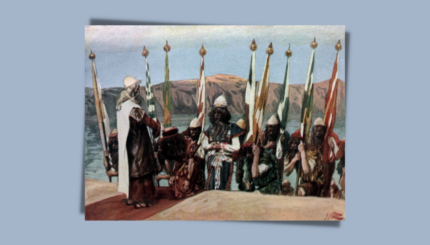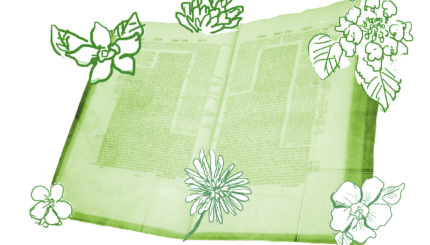Commentary on Parashat Sh'lach, Numbers 13:1 - 15:41
After the Levites are appointed caretakers of the Dwelling Place for God and the Sanctuary is anointed, God says to Moses, “Send out men to explore the land of Canaan which I am giving to the sons of Israel.”
Each of the tribes of Israel sent a leader for the exploration. Moses said to these explorers, “See if the land is good or bad, fertile or lean. Are the people strong or weak, few or numerous? Are the cities opened or fortified?”
Since it was the time for grapes to be in season, the explorers went as far as the Valley of the Grapes. They cut down a cluster of grapes and gathered pomegranates and figs. They returned from spying at the end of 40 days. They showed Moshe and Aaron and the entire community the fruit of the land and said, “We came into the land and it is indeed flowing with milk and honey. But the people that dwell in the land are too strong, and the cities are greatly fortified.”
Caleb spoke up to silence the people, “We can go in and take possession of the land. We are able to do it.” But the men who had gone with him did not agree and retorted, “We cannot go against these people. They are giants and we are but grasshoppers.”
The entire community raised its voice and the people wept throughout the night. They railed against Moses and Aaron. “We would rather have died in Egypt than to have come here to this land to be fallen by a sword. Let us go back to Egypt.”
Moses and Aaron fell upon their faces before the whole assembly of the community of the sons of Israel. Joshua, son of Nun, and Caleb, son of Yefunneh, both spies sent into the land, tore their garment in mourning and then said to everyone, “The land we explored was good land, very good land. If God is pleased with us, God shall bring us into this land and give it to us, a land truly flowing with milk and honey. We must not rebel against God. These people of the land are not to be feared, for they are our bread. Their protection has parted from them, for God is with us. We need not fear them.”
But the entire community said to pelt them with stones until the glory of God appeared to all the Children of Israel in the Tent of Appointed Meeting. God said to Moses, “How long will these people provoke Me? How long will they put no faith in Me despite all the signs that I have performed in their midst? I will smite them with the plague and annihilate them.”
Moses said to God, “The people of this land will hear that you are the God who brought us out of the land of Egypt and the God who steers the people with a cloud. What will they say if you kill us? Will they say that you were not powerful enough to bring the people into the Promised Land?
“Therefore, let it be as You once uttered it, God, ‘The Lord, slow to anger, abundant in kindness; Forgiver of iniquity and transgression who cleanses, but does not clean completely, recalling the iniquity of parents upon children to the third and fourth generations.’ Pardon, I pray, the iniquity of this people according to Your great kindness, as You have forgiven this people ever since Egypt.”
God said, “I will forgive, but let it be known that all those who have seen My glory and the signs I performed in Egypt and in the wilderness and who have still chosen to spurn me shall not see this Promised Land. But My servants Caleb and Joshua were imbued with a different spirit and remained loyal to Me. I will bring them into the land and their offspring shall hold it as a possession.
“As for the rest of you who scouted the land, I heard your murmuring of revolt against Me. Your corpses will fall in this wilderness and only your children will enter the land. But first your sons shall wander about in this desert for forty years, one year for every day the scouts were exploring. Then everyone shall know what it means to thwart Me.”
And so it came to be that the scouts who spread lies about the land died suddenly before God. Only Joshua, son of Nun, and Caleb, son of Yefunneh, survived.
God told Moses to instruct the Israelites that upon entering the land they are to give offerings to God and are to remember, throughout all generations, that strangers who enter their land shall be equal with them before God. There is one standard for everyone.
Moses continued with God’s instructions: In this land, you shall make a gift to the Lord from the first yield of your baking.
If you don’t heed these commandments, then the whole community must prepare for atonement. If an individual sins, then a personal offering must be made. Acts of inadvertence will be forgiven. But for the citizen or stranger who rebukes God, that person shall be cut off from his people. The person shall be cut off with his guilt.
Once the Israelites were in the wilderness, they came upon a man gathering wood on the Sabbath. When he was brought before Moses, Aaron and the community, God ordered the man to be stoned to death.
Then God said to Moses, “Tell the Israelites to make fringes on the corners of their garments with a cord of sky-blue. Each thread shall remind you of the commandments of the Lord. They shall remind you to remain holy to your God, who brought you out of the land of Egypt to be your God.”
Parashat Sh’lach Discussion Questions
1) Why do you think the people continue to not trust in God after all the miracles God has performed for them? Do you ever lose your trust in God? Why?
2) Why do you think it is important to have one standard before God for citizen and stranger alike? Do you treat people differently if they are strangers or are from a different culture or religion or country?
3) Why would gathering wood on the Sabbath cause a penalty of death?
Reprinted with permission from Jewish Family & Life!
Moshe
Pronounced: moe-SHEH, Origin: Hebrew, Moses, whom God chooses to lead the Jews out of Egypt.


